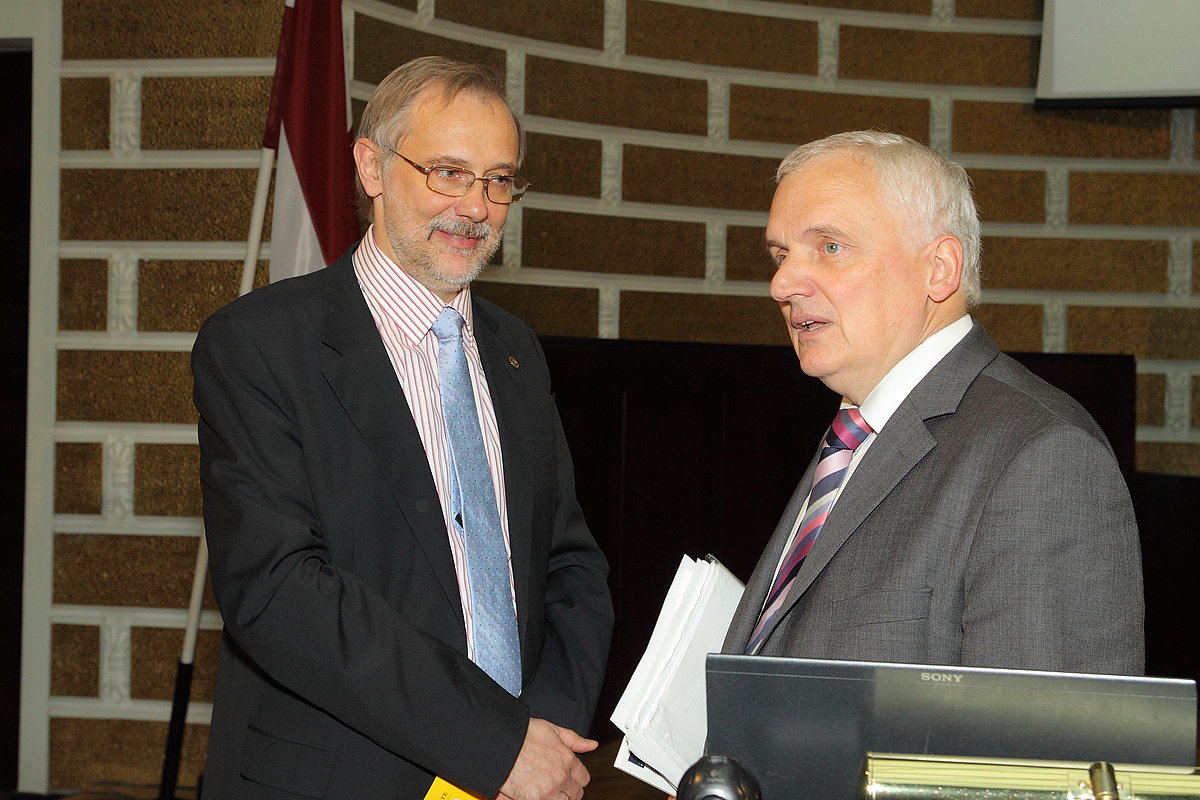
Opportunity to Become a News Reporter
Before opening the regular lecture series, the Rector of the University of Latvia, Marcis Auzins, expressed his delight that each time the number of listeners of “Readings by World Leaders” tends to increase. In addition, the Rector emphasized the role of news in contemporary society, where each of us, apart of news agencies, is able to become a news reporter at any time, due to the information technologies and social networks.
To continue, the President of the Republic of Latvia, Valdis Zatlers, expressed his gratification that the lecture series are still continued, thanks to the cooperation between the Chancellery of the State President and the University of Latvia. The President acknowledged that nowadays each of us lives in a big, but connected and very changeable world, where everyone has the right to feel a part of this world.
“Today we encounter lots of changes both as humanity and individual personalities. Communication underpins the development of society, thus it is essential to analyse communication processes,” said V. Zatlers, inviting the audience to raise hands if they have mobile phones, and they are ready to eternalize this moment in the picture. Thus, they would visualize the readiness of modern people to become not only eyewitnesses, but also news reporters in any place at any time.
To Be an Eyewitness
Modern society has proved an individual’s status is not essential; all individuals are part of the media, whether you are the President or a fireman. Each individual, when becoming an eyewitness to some situation, can affect the situation not only in the business world, but also in politics.
“It is evident. You are already aware of that. However, when it comes to the world of economics, politics or security, that all can turn out as delusive,” in the opening part of the lecture series emphasized Nik Gowing, based on his professional experience in delivering reports from such crisis-affected areas as Kosovo, Iraq, Twin Towers, Georgia and many others.
The experienced journalist distinguishes the following elements of the modern information era: 1) the vulnerability of power, weakness and fragility; 2) new kind of responsibility and 3) the lack of lawfulness. These are contemporary challenges, created by modern technologies and they must be responded to quickly and effectively by respective institutions.
“People, who sometimes are forced to become eyewitnesses of some critical events in a particular moment, do not even realize that they may act journalists. The opportunity to report immediately from the place of event now is facilitated by new technologies, and it can be regarded as a new type of democratization,” emphasizes N. Gowing, instantly projecting live broadcast of the present audience on the wall of the Great Hall. “There is no single recipe how to create a proper crisis communication. There is still a question – Are we ready for that? We must be ready to accept that everything can be filmed, photographed or recorded in different ways. We should remember that in all situations. This new trend introduces tremendous changes in the usual media environment.”
To justify his belief, the lecturer referred to many so-called political journalism video examples from crisis points all around the world, verifying that due to new technologies, changes can be noticed also in the sources of traditional media news and editorial work. As an example, the BBC World television company has its special department, which deals with editing and processing of materials provided by accidental news reporters. Besides, BBC World does not pay for such information, unlike other media, which are ready to pay a huge amount just to get an exclusive video from a “simple citizen” or witness, who accidentally filmed some event, for example, from the window of his flat.
“New media environment is invaluable to nongovernmental organizations, because it is a way how to report current problems, addressing respective institutions to find possible solutions,” adds N. Gowing. “I call this time tyranny, because the present moment can be merciless and arbitrary, thus affecting many processes in the society, economics and politics. We have reached the point where a definite news report, message and recorded file have the shortest time line, but the greatest impact.”
In conclusion, Nik Gowing once again emphasized that it depends on each of us, how we treat media environment, which changes irreversibly and affects current news agenda. It should be taken into account that we all are reporters, and today we are able to report every event from every place in the world. Undoubtedly, this affects the relationship between the state and the individual, reducing manipulations from the government and institutions.
Translated by students of the professional study programme Translator of the University of Latvia.
Translated by students of the professional study programme Translator of the University of Latvia.

 CONFERENCE
CONFERENCE